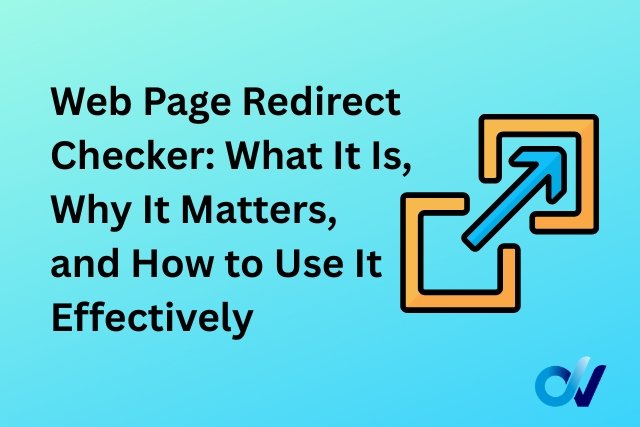
Web Page Redirect Checker: What It Is, Why It Matters, and How to Use It Effectively

Ever click on a link & end up somewhere completely different? Happens to all of us. That’s what’s called a web page redirect. You might not notice it, but it’s happening behind the scenes. Redirects are used to send people or search engines from one web address to another. Usually, this happens when a page moves or changes. Website owners, SEO experts, & even people who build websites, everyone needs to handle redirects carefully. Why? So, visitors don’t get lost & search rankings stay healthy.
A tool called a Web Page Redirect Checker comes in handy for this. It helps spot problems with redirects, which might mess up how your website works, hurt your visitors’ experience, or damage your spot in search results.
What Exactly is a Web Page Redirect?
A web page redirect is a shortcut. It’s a way websites push visitors—plus bots like Google—from one web page to another automatically. This is done when a page is renamed, deleted, or moved somewhereelse. If you try to visit the old page, the server tells your browser, “This page no longer lives here.” Then, you get sent to the new spot (sort of like a digital moving truck).
Most of the time, when someone clicks a link that gets redirected, the browser or Google receives a special code (like 301 or 302). This little code tells it if the move is permanent or just for now. That’s how magic works.
Types of Redirects
Redirects come in different types. Stick with me, it’s important.
- 301 Redirect (Permanent): Used when the page is gone forever. Search engines like this, because all the “good stuff” from the old link moves to the new one.
- 302 Redirect (Temporary): Used only if the page comes back soon. Not for long-term moves.
- 307 Redirect (Temporary - HTTP 1.1): Kinda like 302 but keeps the way information is sent safe. You’ll see it more in forms & APIs.
- Meta Refresh Redirect: Happens inside a web page itself, with a short timer (“Wait 5 seconds, then boom, new page!”). Not the best for search engines.
- JavaScript Redirect: Done with a script. Again, not the best choice, because search engines might not follow the redirect.
They each have a job. Picking the wrong one? Could it mean your visitors are confused, or your site’s SEO loses points.
Why Should You Care About Redirects?
Redirects matter. Here’s why you should care:
- User Experience: Nobody likes clicking a link to find nothing there. Redirects stop that dead end.
- SEO Rankings: When you use a 301 redirect, your SEO power follows along. Rankings don’t drop off a cliff.
- Avoiding Broken Links: No one likes 404 errors. They make your website look bad & irritate people.
- Website Changes: Moving to a new domain? Changing links? Redirects make sure you don’t lose your visitors or SEO gains.
Skip redirects or mess them up? You risk losing your place in search results. You might also look untrustworthy to your visitors.
Why Use a Redirect Checker Tool?
A Redirect Checker does a job you can’t easily do by hand—finds redirect issues. Here’s why it matters:
- Checks Everything: Makes sure your redirects use the right code (like 301, not 302).
- Finds Chains & Loops: Catches situations where there are too many redirects, or they keep going in circles.
- Saves Your SEO: Stops you from losing your website’s power because of mistakes.
- Helps Search Engines: Makes it simpler for Google and others to crawl your website.
- Flags Old Stuff: Lets you know if there are old redirect rules that need cleaning up.
Just type in your URL. The tool does the work and points out problems you might’ve missed.
6 Common Questions About Redirect Checkers
Q1. What’s a redirect chain & why should you steer clear?
A. When one redirect leads to another & then another. Slows things down. Not good for SEO.
Q2. How do I know my 301 redirect works?
A. Use a redirect checker. Put in your old URL & see if it bounces you to the new spot with a 301 code.
Q3. Can too many redirects hurt my SEO?
A. Yes. Too many can slow your website & confuse search engines, which is not good for rankings.
Q4. Can a redirect checker spot slow pages?
A. Not straight out. But it will highlight chains that slow down your site.
Q5. Should I use JavaScript or meta redirects?
A. It’s better not for SEO reasons. Search engines don’t always handle them right. Use a 301 or 302 server-side redirect instead.
Q6. How often should I check my site for redirect issues?
A. Every few months. Especially if you’re making changes or moving stuff around. A regular check stops small problems from getting big.
Conclusion / What to Do Next
Redirects really matter for anyone running a website. They help visitors, protect search spots, & make sure everything works as planned. Use a Redirect Checker tool so you can catch any mistakes early. That’s the key to keeping your website strong, both for users & for search engines.
🔍 Try our free Redirect Checker today. Spot issues fast—keep your website at its best!

Digitek Vista
www.digitekvista.com
Digitek Vista provides the most powerful 100% FREE SEO Tools that are built to make digital marketers smarter, not harder. From keyword research and backlink analysis, to on-page SEO checks and rank tracking, our tools enable you to increase your website’s visibility and drive more traffic and sales—all while saving time. Whether you are a professional or a novice, the tools really do bring real results and are easy to use. With these no-cost solutions, you can immediately start optimizing your site now.





